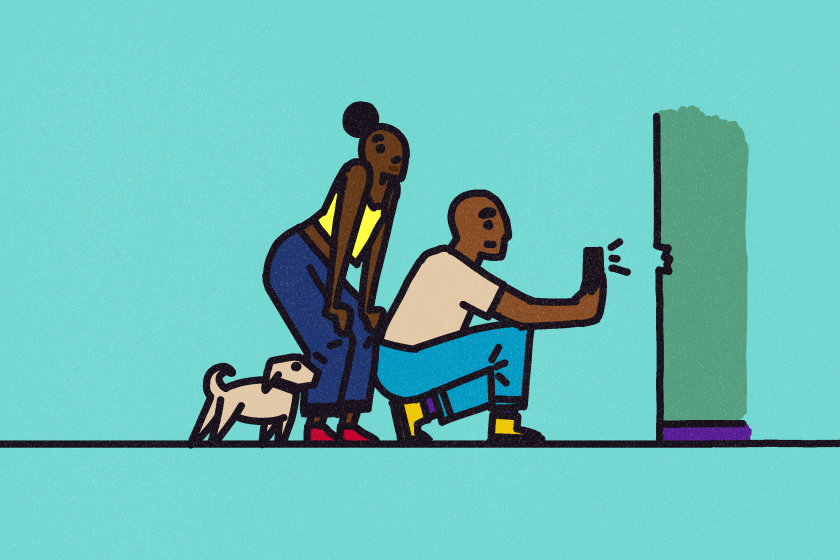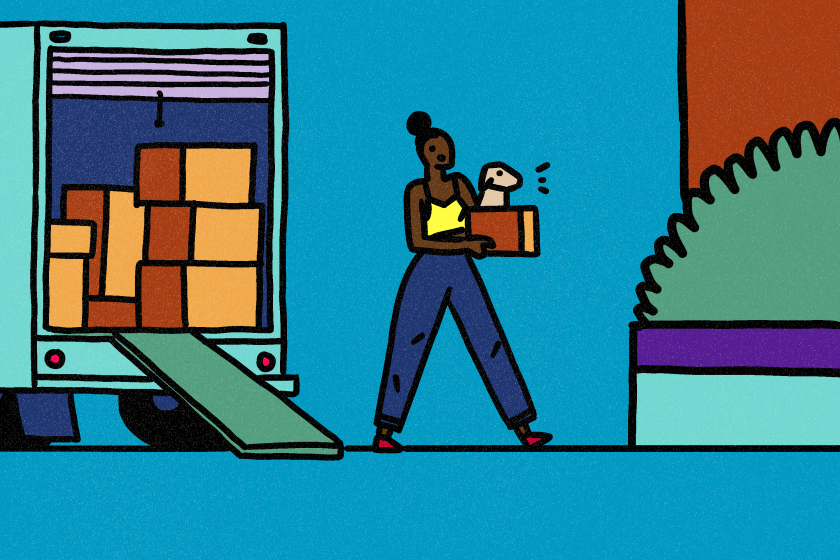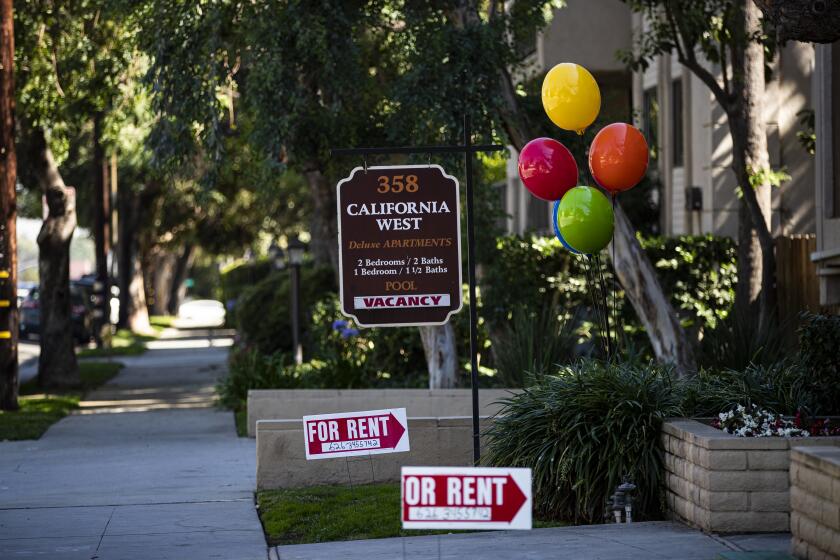Looking for your first apartment in L.A.? Start here

- Share via
Welcome to adulthood. Your back hurts all the time, your glasses prescription keeps getting stronger and you now get to participate in the monthly ritual you’ve heard about your whole life: paying rent.
As glamorous as it all may seem, having your own place to call home comes with a lot of responsibility.
Here’s your guide to renting your first apartment.
Where to start looking
It can seem like an impossible task to find your first place, but plenty of websites can help you sort through rental listings. Beyond Zillow and Redfin, try Southern California-specific sites such as Westside Rentals or neighborhood Facebook groups. Another idea: Walk, bike or drive around the area where you want to live and look for “for rent” signs. Not all landlords list online.
When it comes to finding a place to live, there’s a lot to consider. Here are a few things to ask yourself:
- Do you qualify for affordable housing programs?
- Is a unit you’re considering covered by rent control?
- Do you want to live on your own or are you willing to have a roommate or roommates?
- If you’re willing to rent a room, do you want your own bathroom? Or are you willing to share a bathroom and even a bedroom?
- How will you get around? Walking, cycling or public transit? Are you close to the places you regularly go?
- Do you have a car? If so, are you comfortable parking on the street or would you rather have a parking spot?
- If you have to park on the street, what does parking look like at the time of day you’re planning on being home? Drive by the unit around that time to see.
- Do you want in-unit laundry or are you OK with a shared laundry room or using a laundromat?
- Do the laundry room machines take coins, a credit card or use an app? If it only takes coins, remember the coin shortage during height of the COVID-19 pandemic.
- What utilities, if any, are included in the rent?
- Can you afford the rent and utilities?
- What’s the neighborhood like? Noisy? Quiet? Will your lifestyle work there?
- What are your “must-haves” and your “nice-to-haves?”
- You want to make sure you find the right unit for you, but there will always be compromise. Decide what you can and can’t give up.
Lisa Richardson, hotline coordinator for Tenants Together, a tenants rights group based in Los Angeles, said an important consideration to make is what kind of landlord do you want. Do you want an independent landlord? Or would you prefer a management company?
There are pros and cons to each. Companies usually have set standards for maintenance, while a private owner might be more flexible about delayed rent payments.
Also consider what your long-term goals are, she said. Do you want to own a house in the next five years? Budget for how much you can spend on rent yet still be able to save for a sizable down payment.
To find the right roommate, you might first have to find yourself. Here are tips and strategies for making a roommate match and keeping the relationship healthy.
On your apartment tour
Once you’ve found the unit of your dreams, or at least one in your budget, it’s time to start hammering out the details.
“Don’t rush into it,” Richardson said.
Because of the coronavirus, in-person tours were limited, but many landlords still offered video tours. Seeing the unit in person, Richardson said, versus just looking at pictures can reveal things that are easily hidden by camera angles and photo editing software. So see a unit in person if you’re able, or take a live video tour.
If you can’t see the unit in person, do your research on the unit, the landlord or property management company and the area it’s in. “Know what you’re getting into,” she said.
Whether the visit is in person or virtual, there are a few things you want to check for:
- Any serious damage such as holes or cracks in the ceiling, floors or walls.
- Working light switches. Flip each one to check.
- Working wall outlets. Bring a phone charger and plug it in to make sure there’s power.
- Whether there’s hot water and how long it takes to heat up. Turn on all the faucets in the sinks and in the shower.
- What the water pressure is like, especially in the shower. Let the faucets run for a minute to see.
- Whether the windows seal properly. Place your hand along the edges to feel for a draft.
- A gas leak in the oven. Open the door and take a whiff.
- Where the water heater is located, and that it’s in a permitted area in the unit.
- The presence of smoke and carbon monoxide detectors.
- Things like dark spots or bubbles in the paint can be signs of water damage. Check the ceiling, the floor and under the sinks.
- The presence of mold anywhere in the unit but particularly on the ceiling and in the bathroom.
- Rusty, leaky or broken water taps in the bathrooms and the kitchen.
- Damaged flooring.
- Evidence of an infestation of any kind.
- Chipping paint in an older building may contain lead, so if your unit was built before 1978, research what you can do to prevent potential harm.
What you can do before, during and after your tenancy to get as much of your security deposit back as possible, plus what to do in case of a dispute with your landlord.
Once you’ve done your own inspection, you can start asking the landlord some questions. Here are a few examples of some need-to-know information before making your decision on a unit.
- Parking
- Is there dedicated parking with this unit?
- If a spot or spots are available, is it included in the rent?
- If not included in the rent, how much is the fee per month?
- If there isn’t a spot, what options are there?
- If the only option is street parking, how easy is it to find a spot? Will you be able to find a spot? Try visiting the unit in the morning and late in the afternoon to see what parking is like. A good rule of thumb is that if you can find a spot around 5 p.m., parking shouldn’t be an issue.
- Appliances
- What appliances are included in the unit?
- How old are the appliances?
- If something goes wrong with the appliances, who is responsible for repairs?
- What utilities are covered with the rent?
- How much do utilities typically cost for this unit?
- Are utilities allocated or individual? Allocated utilities refers to when a building shares the same meter for utilities, then each unit pays its share based on square footage, number of residents and other factors determined by the landlord. By law, your landlord has to disclose whether the utilities are allocated or individual.
- Will I have to set up the utility accounts in the unit?
- Renovations
- What kinds of changes can I make to the unit?
- Will I need to revert the changes I make before I move out?
- Pet policy
- Are pets allowed?
- Is there a down payment required for pets?
- Is there a monthly payment for pets?
- Are there any limitations on species, breed or size for pets?
- Lease
- How much is the security deposit?
- How much of the security deposit can I expect to get back when I move out?
- What are the terms for breaking the lease?
- Community
- What is the neighborhood like?
- What are the rules and preferences for the community? Things like shared spaces can be subject to rules and regulations in the lease.
Remember: This is going to be your home, so make sure it’s what you want and need.
Affordable housing, such as Section 8 and public housing, is available, but it often requires navigating applications and government agencies. Here’s what you need to know.
Before you sign the lease
Step one is completing a rental application, according to the California Department of Consumer Affairs. There may be a fee to cover the cost of checking your credit, and in some cases, a tenant screening service that looks at your previous rental history. A landlord or property management company can charge up to $53.33 per application.
Proceed with caution. Rental listings can be used as scams to get you to send money for an application fee or a down payment when there’s no unit available. Never send money to someone via electronic delivery and always be sure to see the unit before signing any paperwork. If you can’t go yourself, ask for a virtual tour or for a friend to go in person for you.
In California it is illegal for a landlord to ask you questions or deny you housing based upon your “race, color, religion, sex, sexual orientation, marital status, national origin, ancestry, familial status or any disability,” according to Government Code Section 12955(b).
You can be denied a unit because of your credit score. If this is the case, the landlord is legally required to provide in writing that the cause for your application’s rejection was based on your credit and nothing else.
There are some exceptions to these rules. If you are renting a room in someone else’s home, they may set limitations on who they will and will not rent to. They cannot set these limitations publicly through advertisements or through oral statements, but they may do so in their decision making. Homeowners renting out a room still cannot discriminate against someone because of their age or medical condition.
Next up is the down payment, or a holding deposit. This payment ensures that the landlord won’t rent the unit to someone else and also can be used to cover costs of repairs when you move out (check out how you can make sure you can get it back). Be sure to ask if the down payment counts toward your first month’s rent, or if you’re expected to make separate payments.
For an unfurnished unit, a landlord may not charge more than twice the amount of monthly rent for a down payment. A furnished unit can cost up to three months’ rent.
Then there’s the lease agreement. These can be oral or written. Richardson said you should get it in writing. By getting the terms in writing, you’re protecting yourself from being taken advantage of in the future.
Make sure you understand what the lease agreement says, Richardson said. If you don’t understand, feel as if the lease is missing something, or has too many demands, you can negotiate.
Landlords may require their tenants to take out a renter’s insurance policy up to a certain amount. Renter’s insurance covers damage to personal property due to theft or fire.
If you are planning to rent an apartment or house and have a pet, here’s a guide to searching for the right place and negotiating with a landlord.
Moving day
Once the paperwork is signed and the deposit is paid, it’s time to move in. Moving day can be extremely stressful, but to navigate it successfully, check out the Los Angeles Times’ guide to making a move with ease.
Home sweet home
Your plants are in their new spot by the window, you’ve got your towels hung on the rack in the bathroom, and your unit is on its way to feeling more like home.
Now that you’ve sealed the deal, it’s important to remember that as a tenant in the state of California, you have rights.
Your rights include the following:
- Your landlord must give you at least 24 hours’ notice before entering the property, unless it’s an emergency.
- You are entitled to have your security deposit returned or to receive an itemized receipt showing how it was used to pay for repairs after you move.
- You may sue if your landlord violates the terms of the lease.
- If at any point your unit becomes uninhabitable, the landlord must pay for the repairs to restore it to a livable state. If the landlord does not pay for these repairs within 30 days and you do so out of your pocket, you are legally allowed to deduct the amount for repairs out of the monthly rent.
- You may also withhold rent if the unit is deemed uninhabitable and the landlord refuses to make the necessary repairs.
- Your landlord cannot evict you because you are withholding or deducting repair costs from your rent if they are not meeting their responsibilities.
Withholding rent, lawsuits and evictions are complicated — seek help from a tenants’ rights group or a lawyer.
Knowing your rights, Richardson said, is one of the most powerful things you can do as a tenant. If at any point you feel that something is wrong, find out what your local protections are and exercise those rights.
Does your apartment have rent control? Does the rental you want to move to have it? Here’s how to find out in Southern California.
More resources
- California tenants’ rights brochure
- Tenants rights, laws and protections (from HUD)
- Tenants Together
- Long Beach Residents Empowered
- Housing and Homelessness coverage from the Los Angeles Times
More to Read
Sign up for Essential California
The most important California stories and recommendations in your inbox every morning.
You may occasionally receive promotional content from the Los Angeles Times.












